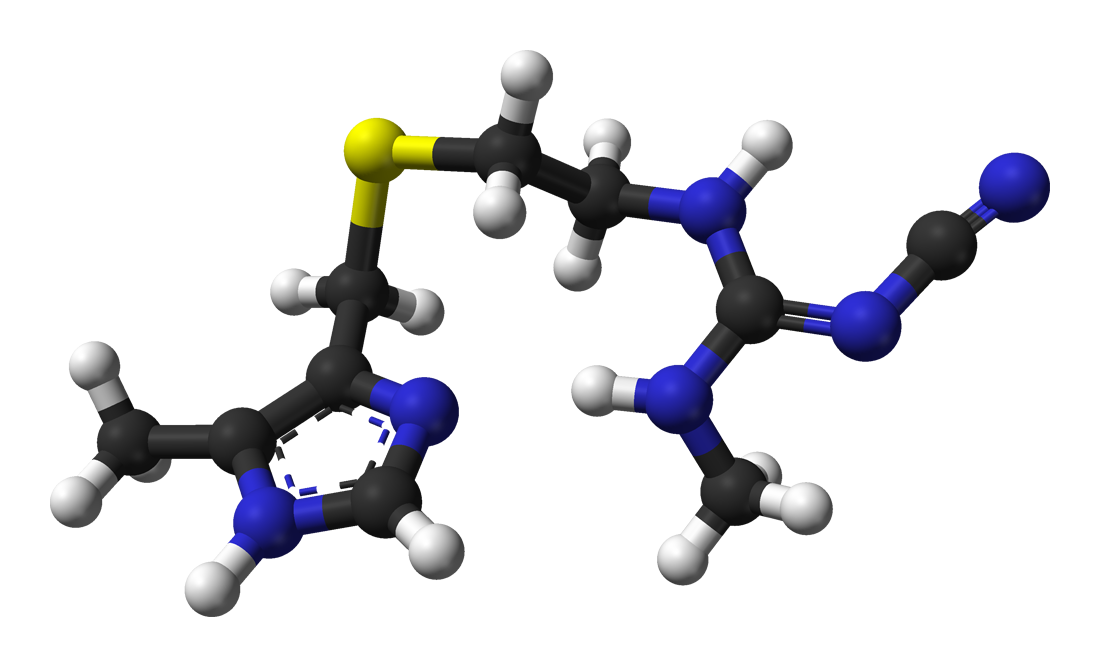| name | Cimetidine |
| classification | H2-receptor antagonist |
| pharmacokinetics | | absorption | Rapidly absorbed from the GI tract, but first-pass metabolism is significant. | | distribution | Widely distributed throughout the body, including the brain. | | metabolism | Hepatic metabolism, primarily by CYP450 enzymes, leading to active metabolites. | | excretion | Eliminated primarily in the urine as metabolites. |
|
| dosage | | adult male 25 70kg | | typical dosage | 200-400 mg every 6-8 hours as needed or 800 mg at bedtime | | commentary | Dosage adjustments may be necessary depending on individual patient response and specific condition. | | notes | Consult a healthcare professional for specific dosage recommendations. |
|
|
| indications | | 1 | Peptic ulcer disease | | 2 | Gastroesophageal reflux disease (GERD) | | 3 | Zollinger-Ellison syndrome | | 4 | Prevention of stress ulcers |
|
| safety in pregnancy | | classification | Category B. Use only when clearly needed, and only after careful consideration of potential risks and benefits. Adequate human studies are lacking. | | commentary | Potential for fetal harm is thought to be low, but use during pregnancy should be avoided if possible, and appropriate monitoring is recommended if used. |
|
| safety in breastfeeding | | classification | Limited data. May be present in breast milk. Use only when clearly needed, and only after careful consideration of potential risks and benefits, and closely monitor the infant for any adverse effects. | | commentary | Cimetidine has a potential to affect infant development. |
|
| side effects | | 1 | Headache | | 2 | Dizziness | | 3 | Confusion | | 4 | Constipation | | 5 | Diarrhea | | 6 | Nausea | | 7 | Vomiting | | 8 | Abdominal pain | | 9 | Gynecomastia | | 10 | Liver dysfunction | | 11 | Blood disorders | | 12 | Central nervous system (CNS) effects including sedation | | 13 | Nephritis | | 14 | Dermatitis |
|
| alternatives | |
| contraindications | | 1 | Known hypersensitivity to cimetidine or related drugs | | 2 | Severe renal impairment | | 3 | Severe hepatic impairment |
|
| interactions | | 1 | Drugs metabolized by the CYP450 system (e.g., warfarin, phenytoin, theophylline) | | 2 | Alcohol | | 3 | Other medications. Cimetidine can impair the metabolism of many drugs, leading to increased levels and potential toxicity. |
|
| warnings and precautions | | 1 | Caution in patients with renal or hepatic impairment. | | 2 | Monitor for adverse effects, especially liver or kidney problems. | | 3 | Use with caution in patients with a history of seizures or CNS disorders. | | 4 | Monitor patients closely for signs and symptoms of blood disorders or other significant adverse reactions. |
|
| additional information | | 1 | Long-term use of cimetidine may cause significant side effects. Use the lowest effective dose for the shortest duration necessary. | | 2 | Cimetidine has been linked to gynecomastia in some patients. Regular monitoring is crucial for individuals at risk. | | 3 | Always consult a healthcare professional before starting any new medication. |
|

